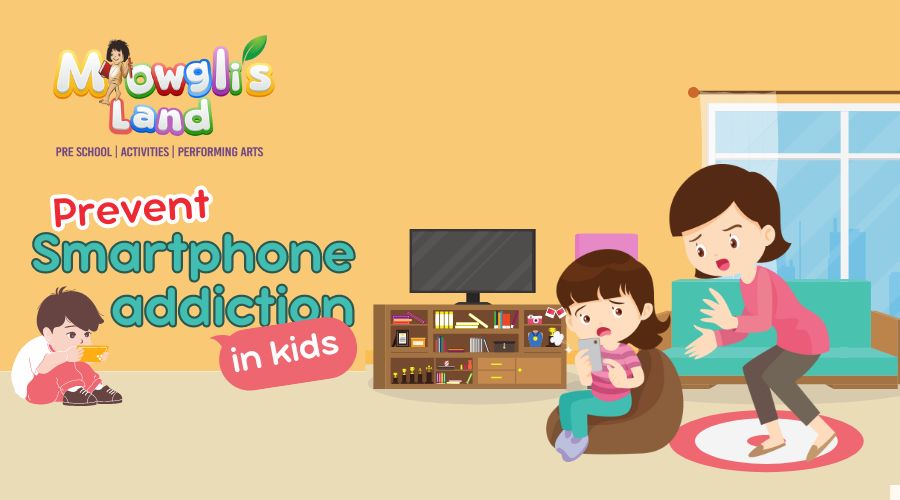Introduction
In today’s digital age, smartphones have become an integral part of our lives, but their pervasive presence has also led to the growing issue of smartphone addiction, even among very young children. Kindergarten-aged kids are particularly vulnerable in critical cognitive and social development stages. Addressing this issue early is crucial to ensuring healthy growth and development. This blog provides insights into understanding, preventing, and managing smartphone addiction in kindergarten kids.
Understanding Smartphone Addiction in Kids
Smartphone addiction in young children can be defined as excessive and compulsive use of mobile devices, leading to negative impacts on their daily lives and development. Signs of smartphone addiction in kindergarten kids include tantrums when the phone is taken away, reduced interest in other activities, and excessive screen time beyond the recommended limits.
Recent research indicates a significant rise in smartphone usage among young children. A study by Common Sense Media found that 98% of children under eight have access to a mobile device, and the average screen time has doubled over the past few years. These alarming statistics highlight the urgency of addressing smartphone addiction in early childhood.
The Impact of Smartphone Addiction on Young Minds
The effects of smartphone addiction on young children are profound and multifaceted. Cognitively, excessive screen time can hinder language development, attention span, and critical thinking skills. Children addicted to smartphones may struggle with face-to-face communication and exhibit delayed social skills, affecting their ability to form relationships and interact with peers.
Emotionally, smartphone addiction can lead to increased anxiety, irritability, and mood swings. The constant stimulation from screens can make it difficult for children to manage their emotions and develop healthy coping mechanisms. Physically, prolonged screen time can cause issues such as eye strain, poor posture, and disrupted sleep patterns, which are detrimental to their overall health and well-being.
Strategies for Preventing Smartphone Addiction
Preventing smartphone addiction in young children requires a balanced approach that involves setting clear rules, encouraging alternative activities, and being a positive role model. Here are some effective strategies:
- Setting Clear Rules and Boundaries: Establish specific times and limits for smartphone use. Mowgli’s Land Preschool recommends no more than one hour of screen time per day for children aged two to five.
- Encouraging Alternative Activities: Promote a variety of engaging and enriching activities such as outdoor play, arts and crafts, reading, and puzzles. These activities help develop creativity, motor skills, and social interactions.
- Being a Role Model: Children often mimic adult behavior, so parents and educators must demonstrate healthy smartphone usage. Limit your screen time and engage in activities with your children to set a positive example.
Mowgli’s Preschools in Addressing Smartphone Addiction
Mowgli’s Land plays a vital role in preventing smartphone addiction among young children. By implementing policies and guidelines for smartphone use, schools can create a balanced environment that prioritizes learning and social interaction. Some effective measures include:
- Tech-Free Times: Incorporate periods during the school day where smartphones are not allowed, encouraging children to engage in face-to-face interactions and hands-on activities.
- Education and Awareness: Educate children and parents about the risks associated with excessive smartphone use and promote healthy digital habits.
- Support Systems: Provide resources and support for parents and children struggling with smartphone addiction, such as counseling and workshops.
Practical Tips for Parents and Educators of Preschools
To effectively manage and prevent smartphone addiction, parents and educators can implement practical tips and strategies:
- Balanced Routine: Create a daily schedule that includes a mix of screen time and other activities. Ensure that children have ample time for physical activity, creative play, and rest.
- Educational Content: Use educational apps and content that promote learning and development. Monitor the quality and appropriateness of the content to ensure it aligns with educational goals.
- Open Communication: Discuss smartphone usage with children and explain the importance of balanced screen time. Encourage them to express their feelings and concerns about smartphone use.
Conclusion
Avoiding excessive use of smartphones by kindergarten kids is essential for their healthy development. By understanding the signs and impacts of addiction, implementing effective strategies, and fostering a balanced approach to technology, parents and Mowgli’s land educators can help children develop healthy habits and thrive in a digital world. Stay informed, set a positive example, and take proactive steps to manage your child’s smartphone usage for a brighter, healthier future.




